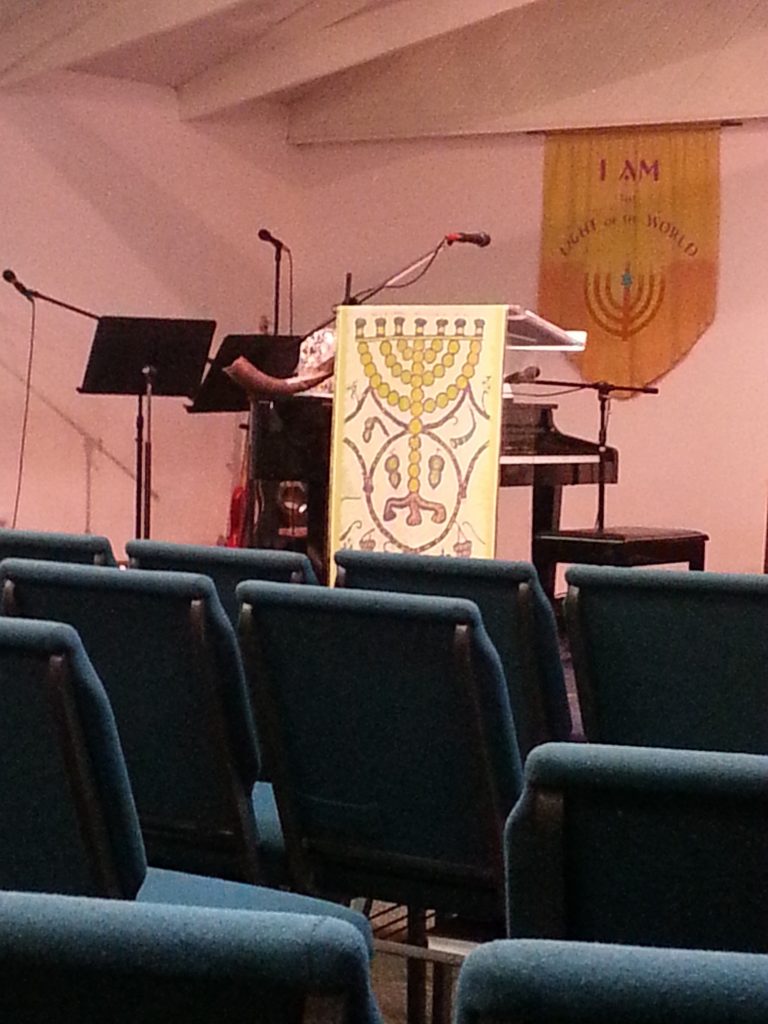Leviticus 23:24 says, “Tell the people of Isra’el, ‘In the seventh month, the first of the month is to be for you a day of complete rest for remembering, a holy convocation announced with blasts on the shofar. (CJB)
Rosh HaShanah started at sundown on October 2nd and ended October 4th at sundown. (The holiday lasts two days outside of Israel. That’s to make sure it’s observed on the right day, given time differences and all.) I was privileged to attend some of this Holy Day’s services at a local Messianic Jewish Congregation. Not only was the experience amazing, I also learned quite a bit about this first of the High Holy Days.
Rosh HaShanah is the new year. (It’s now 5777 on the Jewish calendar.) It commemorates creation.
The traditional greeting is “L’Shanah Tovah,” which means “for a good year.” It’s short for a Hebrew phrase meaning “May you be inscribed and sealed for a good year”—a concept that goes along with Yom Kippur (the Day of Atonement) and the Days of Awe. (Chosen People Ministries has some great articles about the High Holy Days.)
Traditional foods are apples dipped in honey and other sweet apple treats. It’s a reminder that we long for a sweet year ahead.
It also begins a time of introspection and repentance (the Days of Awe). In this, it’s similar to Lent, but pre-dates that Christian liturgical time by a few thousand years.
I’ve attended a couple of Shabbat services at the Messianic Jewish Congregation, so I knew a little bit of what to expect. The liturgy they use is pretty lengthy and in a mix of Hebrew and English. (Which was so cool to listen to.) It’s taken from the Bible, including the Brit Chadashah (the “new covenant” or the New Testament).
One of the things that struck me was how very little repentance is talked about in the Church today. Judaism teaches that repentance or teshuva has four steps that all must take place before repentance can be said to have happened. Teshuva is more accurately translated return. After all, isn’t that the point of repentance? Returning to the Lord?
The steps:
- We need to truly regret what we did. Not just feel guilty, but regret the missed opportunity to follow God’s commands and maintain the open relationship between ourselves and God.
- Leaving the sin. We must do whatever it takes to avoid the path that led to the sin. That might mean taking a different route work, not buying certain foods at the grocery store, making new friends.
- Verbally state the transgression. Something happens when we verbalize something…anything. It makes it real. It formalizes and clarifies it. As long as it remains a vague, nebulous thought, it’s easy to think it isn’t really sin. Not really. When we put that transgression into words, it gets real.
- Resolve never to transgress in this way again. As long as we’re unwilling to do this step, we might as well not waste God’s time in doing the other three. Don’t get me wrong. God’s forgiveness is there no matter how many times we fail. But we can’t have the idea that we don’t have to take teshuva seriously because “Oh, well. God’s grace, you know.” Yeah…no! It doesn’t work that way.
Aish.com has a much more thorough explanation of the four steps.
During the days leading up to Yom Kippur, I plan to spend some time sitting with the Lord and examining things I need to change in order to become more like Jesus the Messiah.
I’d love to hear your thoughts about Rosh HaShanah. Were these teshuva steps a new idea for you? A helpful frame or structure for your times of repentance? Let’s reason together—in the comments.


Thanks for this clear explanation. Not having grown up learning about these holidays, it’s not easy to figure them all out. I love working on learning Hebrew because it’s all like a Bible study – even learning the aleph – bet. I like Hebrew4Christians.com and memrise.com
I agree, Jill. We never learned this in church, but I think it’s so important in to understand. How can we know we’re accurately reading Jesus’ words, if we know nothing about his culture. I’ve not heard of memrise.com. I’ll have to check it out.